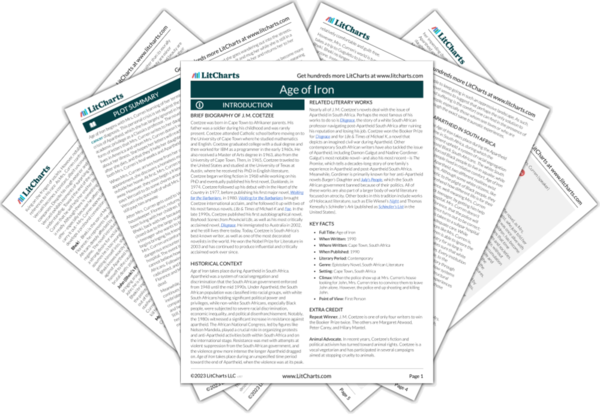Florence Quotes in Age of Iron
Last year, when the troubles in the schools began, I spoke my mind to Florence. “In my day we considered education a privilege,” I said. “Parents would scrimp and save to keep their children in school. We would have thought it madness to burn a school down.”
“It is different today,” replied Florence.
“Do you approve of children burning down their schools?”
“I cannot tell these children what to do,” said Florence. “It is all changed today. There are no more mothers and fathers.”
“That is nonsense,” I said. “There are always mothers and fathers.” On that note our exchange ended.
The country smoulders, yet with the best will in the world I can only half-attend. My true attention is all inward, upon the thing, the word, the word for the thing inching through my body. An ignominious occupation, and in times like these ridiculous too, as a banker with his clothes on fire is a joke while a burning beggar is not. Yet I cannot help myself. “Look at me!” I want to cry to Florence – “I too am burning!”
Children of iron, I thought. Florence herself, too, not unlike iron. The age of iron. After which comes the age of bronze. How long, how long before the softer ages return in their cycle, the age of clay, the age of earth? A Spartan matron, iron-hearted, bearing warrior-sons for the nation. “We are proud of them.” We. Come home either with your shield or on your shield.
“They work with the police,” said Bheki. “They are all, the same, the ambulances, the doctors, the police.”
“That is nonsense,” I said.
“Nobody trusts the ambulance any more. They are always talking to the police on their radios.”
“Nonsense.”
He smiled a smile not without charm, relishing this chance to lecture me, to tell me about real life. I, the old woman who lived in a shoe, who had no children and didn't know what to do. “It is true,” he said—“listen and you will hear.”
The inside of the hall was a mess of rubble and charred beams. Against the far wall, shielded from the worst of the rain, were five bodies neatly laid out. The body in the middle was that of Florence’s Bheki. He still wore the grey flannel trousers, white shirt and maroon pullover of his school, but his feet were bare. His eyes were open and staring, his mouth open too. The rain had been beating on him for hours, on him and his comrades, not only here but wherever they had been when they met their deaths; their clothes, their very hair, had a flattened, dead look. In the corners of his eyes there were grains of sand. There was sand in his mouth.

Florence Quotes in Age of Iron
Last year, when the troubles in the schools began, I spoke my mind to Florence. “In my day we considered education a privilege,” I said. “Parents would scrimp and save to keep their children in school. We would have thought it madness to burn a school down.”
“It is different today,” replied Florence.
“Do you approve of children burning down their schools?”
“I cannot tell these children what to do,” said Florence. “It is all changed today. There are no more mothers and fathers.”
“That is nonsense,” I said. “There are always mothers and fathers.” On that note our exchange ended.
The country smoulders, yet with the best will in the world I can only half-attend. My true attention is all inward, upon the thing, the word, the word for the thing inching through my body. An ignominious occupation, and in times like these ridiculous too, as a banker with his clothes on fire is a joke while a burning beggar is not. Yet I cannot help myself. “Look at me!” I want to cry to Florence – “I too am burning!”
Children of iron, I thought. Florence herself, too, not unlike iron. The age of iron. After which comes the age of bronze. How long, how long before the softer ages return in their cycle, the age of clay, the age of earth? A Spartan matron, iron-hearted, bearing warrior-sons for the nation. “We are proud of them.” We. Come home either with your shield or on your shield.
“They work with the police,” said Bheki. “They are all, the same, the ambulances, the doctors, the police.”
“That is nonsense,” I said.
“Nobody trusts the ambulance any more. They are always talking to the police on their radios.”
“Nonsense.”
He smiled a smile not without charm, relishing this chance to lecture me, to tell me about real life. I, the old woman who lived in a shoe, who had no children and didn't know what to do. “It is true,” he said—“listen and you will hear.”
The inside of the hall was a mess of rubble and charred beams. Against the far wall, shielded from the worst of the rain, were five bodies neatly laid out. The body in the middle was that of Florence’s Bheki. He still wore the grey flannel trousers, white shirt and maroon pullover of his school, but his feet were bare. His eyes were open and staring, his mouth open too. The rain had been beating on him for hours, on him and his comrades, not only here but wherever they had been when they met their deaths; their clothes, their very hair, had a flattened, dead look. In the corners of his eyes there were grains of sand. There was sand in his mouth.











